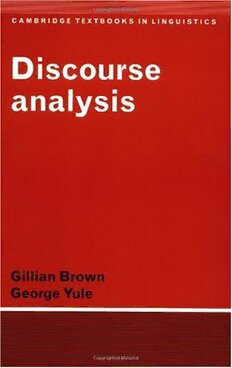
Discourse Analysis (Cambridge Textbooks in Linguistics) PDF
149 Pages·1983·25.656 MB·English
Most books are stored in the elastic cloud where traffic is expensive. For this reason, we have a limit on daily download.
Preview Discourse Analysis (Cambridge Textbooks in Linguistics)
Description:
Discourse analysis is a term that has come to have different interpretations for scholars working in different disciplines. For a sociolinguist, it is concerned mainly with the structure of social interaction manifested in conversation; for a psycholinguist, it is primarily concerned with the nature of comprehension of short written texts; for the computational linguist, it is concerned with producing operational models of text-understanding within highly limited contexts. In this textbook, the authors provide an extensive overview of the many and diverse approaches to the study of discourse, but base their own approach centrally on the discipline which, to varying degrees, is common to them all - linguistics. Using a methodology which has much in common with descriptive linguistics, they offer a lucid and wide-ranging account of how forms of language are used in communication. Their principal concern is to examine how any language produced by man, whether spoken or written, is used to communicate for a purpose in a context. The discussion is carefully illustrated throughout by a wide variety of discourse types (conversations recorded in different social situations, extracts from newspapers, notices, contemporary fiction, graffiti, etc.). The techniques of analysis are described and exemplified in sufficient detail for the student to be able to apply them to any language in context that he or she encounters. A familiarity with elementary linguistics is assumed, but the range of issues discussed in conjunction with the variety of exemplification presented will make this a valuable and stimulating textbook not only for students of linguistics, but for any reader who wishes to investigate the principles underlying the use of language in natural contexts to communicate and understand intended meaning.
See more
The list of books you might like
Most books are stored in the elastic cloud where traffic is expensive. For this reason, we have a limit on daily download.
